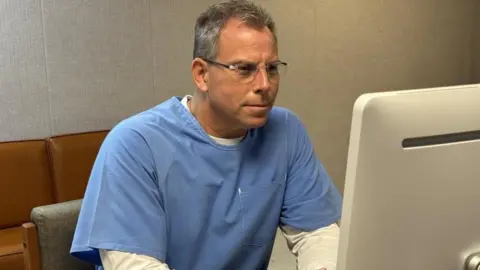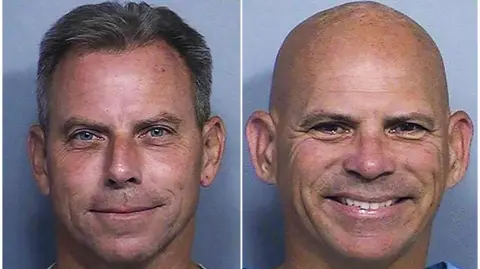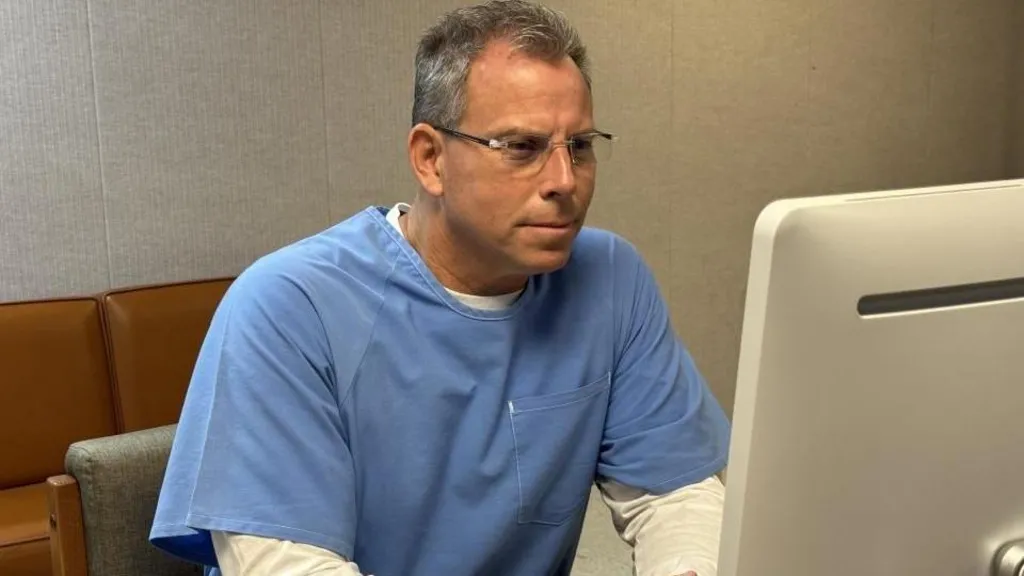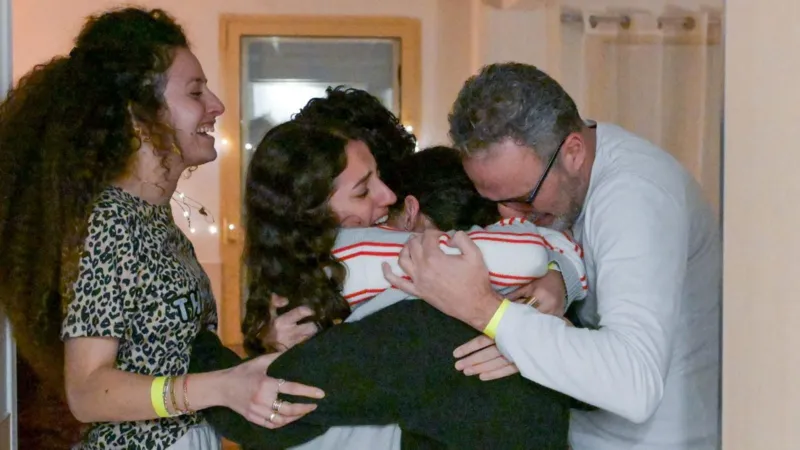BBC News, Los Angeles
 California Department of Corrections and Rehabilitation
California Department of Corrections and RehabilitationErik Menendez’s bid for freedom has suffered a setback, after officials in the US state of California denied him parole over the killing of his parents more than three decades ago.
The younger of the two notorious Menendez brothers, who were both convicted in the 1989 shotgun murders of their wealthy mother and father in Beverly Hills, made his first plea on Thursday.
His brother, Lyle, is scheduled to appear for his own parole suitability hearing on Friday. Both brothers were made eligible for paroled release after they were resentenced by a judge in May.
Erik Menendez can try for parole again at another hearing in three years, the board ruled.
Board commissioner Robert Barton, who listened to testimony for more than 10 hours with a panel before denying Erik’s parole, said he believed Erik was not yet ready for release.
“I believe in redemption, or I wouldn’t be doing this job,” he told Erik at the end of the marathon hearing. “But based on the legal standards, we find that you continue to pose an unreasonable risk to public safety.”
The board took issue, specifically, with his violations in prison and past criminal activity before killing his parents.
“Contrary to your supporters’ beliefs, you have not been a model prisoner and frankly, we find that a little disturbing,” Barton said, bluntly telling him he now had “two options” for his future.
“One is to have a pity party,” Barton told Erik. “Or you can take to heart what we discussed.”
Erik’s bid for freedom is not over. The parole denial is likely to shift focus to California Governor Gavin Newsom, who is separately considering a clemency request from the brothers.
Clemency could come in the form of a reduced sentence or even a pardon, but it would not overturn the brothers’ convictions. Weighing in on such a high-profile and controversial case could be politically risky for Newsom, who is thought to be a potential candidate for the Democratic nominee for president.
As well as their requests for parole and clemency, the brothers have also asked for a new trial, due to additional evidence being discovered in the case.
A judge is mulling that request, but it is opposed by the Los Angeles district attorney’s office.
During Thursday’s hearing, a prosecutor from the Los Angeles district attorney’s office argued against Erik’s release, saying positive changes in his behaviour were only motivated by a chance at release. They argued he was “still an unreasonable risk to society” and that “he has no insight into his crimes”.
Erik appeared virtually for the hearing from the San Diego prison where he has been housed, wearing a blue prison jumpsuit and glasses. Members of his family, his lawyers and the prosecutor also appeared.
During the nearly-full-day hearing, the panel asked him about the killings, his relationship with his parents and his attempts to cover up guilt in the murders. He grew emotional at times, describing the moments he opened fire on his parents, Jose and Kitty Menendez, with a shotgun as they watched TV in their Beverly Hills mansion.
The brothers shot the pair more than a dozen times, Erik even reloading the gun and continuing to fire on his mother. He and his brother have long claimed self-defence and said they were being abused sexually.
“I just want my family to understand that I am so unimaginably sorry for what I have put them through from Aug. 20, 1989 until this day, and this hearing,” Erik said during the hearing, before he knew his fate.
“If I ever get the chance at freedom, I want the healing to be about them,” he said. “Don’t think it’s the healing of me – it’s the healing of the family. This is a family tragedy.”
The board questioned him about his time in prison and legal issues before the killings, including his involvement in two burglaries. He said his time in prison helped him develop a “moral guardrail”.
Board members also cited the brutal nature of the killings, calling them “devoid of human compassion”. And they examined factors such as Erik’s health and whether he would be a danger to society if released from prison. A risk assessment found him to be a “moderate” risk if released.
Panel members reviewed the schooling and programmes with which Erik had been involved while in prison, along with his transgressions – including prison fights and being found multiple times with contraband. While behind bars, Erik has found himself in trouble for possessing a cell phone, art supplies and tobacco – which he had hidden inside a religious book.
 California Department of Corrections
California Department of CorrectionsThe decision over Lyle’s future is a separate matter. He is set to appear before a different parole board panel on Friday morning. The brothers’ conduct behind bars and before the 1989 killings is viewed differently, meaning that Lyle’s case could prompt a different decision from the parole board.
During Thursday’s hearing for Erik, a coalition of relatives, who have long advocated for the brothers’ release, testified on Erik’s behalf – saying he had changed.
Hi aunt Teresita Menendez-Baralt broke down in tears as she spoke before the panel, telling them she had forgiven Erik for killing her brother and the years of trauma he caused their family.
She said that she was dying from stage four cancer. “The truth is I do not know how much time I have left. If Erik is granted parole, it would be a blessing,” she told them.
“I hope I live long enough to welcome him into my home, to sit at the same table, to wrap my arms around him – that would bring me immeasurable peace and joy.”
During their trials, the brothers claimed the killings were done in self-defence and that they had suffered years of emotional and sexual abuse at the hands of their parents.
Prosecutors, though, argued they were greedy, entitled monsters who meticulously planned the killings then lied to authorities investigating the case while going on a $700,000 (£526,000) spending spree using money they had inherited.
The pair were not arrested until police got word of their admissions to a psychologist.
Three decades later, the case was re-examined in the public thanks to a mix of new evidence, attention on TikTok, a Netflix’s drama series and input from celebrities.
But there was no movement in the courts until the Los Angeles’ former top prosecutor re-examined the case and asked for a judge to re-sentence them, citing California’s evolving approach to juvenile offenders and abuse survivors.
A change in state law allows offenders who were under the age of 26 at the time of their crime to be sentenced as minors rather than adults. Lyle was 21 and Erik was 18 when they killed their parents.
Despite the new LA District Attorney Nathan Hochman fighting against the resentencing effort, a judge in May changed their sentences to 50 years to life with the possibility of parole – which represented a reduction.




